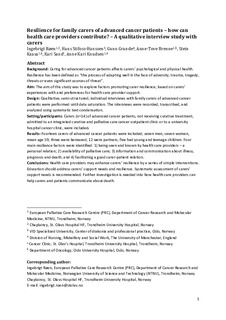| dc.description.abstract | Background:
Caring for advanced cancer patients affects carers’ psychological and physical health. Resilience has been defined as “the process of adapting well in the face of adversity, trauma, tragedy, threats or even significant sources of threat.”
Aim:
The aim of this study was to explore factors promoting carer resilience, based on carers’ experiences with and preferences for health care provider support.
Design:
Qualitative, semi-structured, individual interviews with family carers of advanced cancer patients were performed until data saturation. The interviews were recorded, transcribed, and analyzed using systematic text condensation.
Setting/participants:
Carers (n = 14) of advanced cancer patients, not receiving curative treatment, admitted to an integrated curative and palliative care cancer outpatient clinic or to a university hospital cancer clinic, were included.
Results:
14 carers of advanced cancer patients were included; 7 men, 7 women, and mean age of 59 years; 3 were bereaved; 12 were partners; 5 had young and teenage children. Four main resilience factors were identified: (1) being seen and known by health care providers—a personal relation; (2) availability of palliative care; (3) information and communication about illness, prognosis, and death; and (4) facilitating a good carer–patient relation.
Conclusion:
Health care providers may enhance carers’ resilience by a series of simple interventions. Education should address carers’ support needs and resilience. Systematic assessment of carers’ support needs is recommended. Further investigation is needed into how health care providers can help carers and patients communicate about death. | nb_NO |
